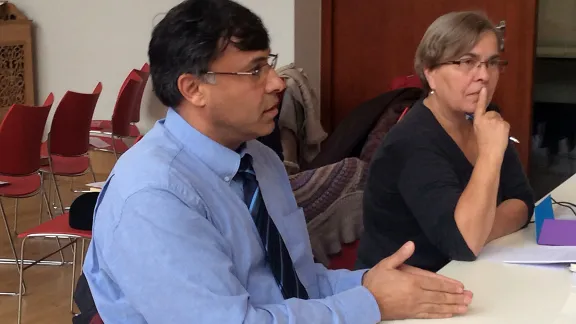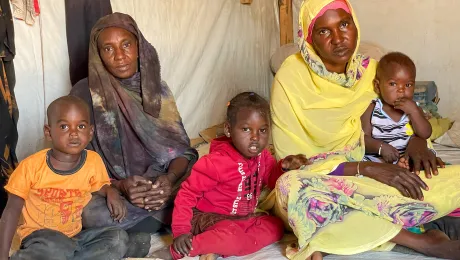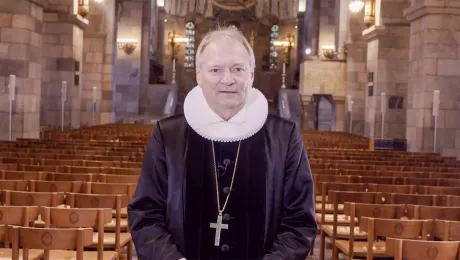
Mr Ivan Ivanov (left), European Roma Information Office, and CCME General Secretary Ms Doris Peschke. Photo: Ilkka Sipiläinen
Diaconal Workers Develop Recommendations for Continuing Ministry
(LWI) – Diaconal workers from across Europe have called on churches to promote service and advocacy with and for Roma people that are rooted in inclusive and justice-oriented theology.
Meeting in Frankfurt, Germany, 22-24 November, representatives of European member churches of The Lutheran World Federation (LWF) and the Churches’ Commission for Migrants in Europe (CCME) said more needs to be done to enhance knowledge in both church and society about the culture and history of the minority Roma communities, who suffer discrimination and marginalization across the continent.
“And then you will be citizens of the household of God (Ephesians 2: 19),” was the theme of the conference jointly organized by the LWF Department for Mission and Development (DMD) and CCME, with a focus on migration of and equal citizenship for Sinti and Roma in Europe. The participants emphasized the need for churches to create space for face-to-face interactions with Roma and sharing of life stories, culture and worship.
The diaconal workers agreed they should continue building alliances with other churches, non-governmental organizations and Roma advocacy groups, and work to create platforms where different minority groups can strengthen one another.
Churches in Europe, they noted, need to speak out against anti-zyganism (hostility directed at Roma people) and highlight both the connection with other prejudices such as anti-Semitism while recognizing that discrimination against Roma is often neglected.
“The [Frankfurt] conference is an important step in gaining an overview of where we as churches in Europe stand today, in relation to service with and for Roma, and especially in our public witness against racism, and anti-zyganism,” said Rev. Dr Eva Sibylle Vogel-Mfato, LWF area secretary for Europe at DMD.
CCME General Secretary Ms Doris Peschke added that many churches both in the countries of origin and those receiving Roma are responding to the needs of the Roma communities, and new ownership has developed since the conference on “Living in Community – Towards equal opportunities and overcoming discrimination” 12 years ago.
Negative Public Discourse on Migration
Participants noted that the context of globalization and ongoing economic crisis in Europe contributes to the fueling of new nationalistic movements along with xenophobia and violence.
The churches’ activities are carried out against a backdrop of a negative public discourse on migration. While freedom of movement for European citizens is regarded as an important value and right, Roma are regarded as abusing this right.
Ms Michelle van Burik of Kerk in Actie in the Netherlands told participants that discrimination against Roma dates to the Middle Ages and was part of the genocide associated with Nazism and the Second World War.
“What do we see today? We see neo-Nazi and fascist parties rising, expanding and consolidating their networks worldwide; we observe attacks on Roma, Sinti and Jews again. Do we realize the dangers of this?” she asked.
Mr Ivan Ivanov, executive director of the European Roma Information Office (ERIO) in Brussels, noted that between 38 and 45 percent of Europeans say they do not want Roma neighbors or colleagues, thus segregated ghettos remain in Europe.
“If the governments invested in education of Roma children and integration into society, States would, at the end, profit on many levels, including economic and social,” he added.
The director of the Roma support organization in Frankfurt, Mr Joachim Brenner, told participants that during the recent elections in Germany politicians encouraged racist emotions against Roma by claiming that “many will come and burden our social services.”
He said that the number of Roma migrants to Germany remains very small and that the country should be able to respond to their needs. “We are … responsible to share with them and support them in their striving for sustainable livelihood and integration.”
Ms Christine Heinrichs of the Frankfurt Association for Social Homes noted that while there are 48 different nationalities represented among the homeless persons in the city, there are only 40 Roma among the 120 persons at risk who are catered for, but they are more visible because they live in groups.
Different Approaches
While reconciliation actions with the Roma minorities in Finland, Norway and Sweden at the end of the 1990s opened space for building new relationships, follow-up initiatives remain a constant process. For the churches, this calls for diaconal engagement that incorporates different approaches.
In Norway, churches work alongside the Red Cross to provide emergency shelter, while attempting to better understand Roma needs.
Church of Sweden congregations are involved in advocacy efforts and work with the Roma on their integration into society.
In Finland the church speaks out for Roma on housing and migration and is engaged in diaconal support. A joint working group has translated Luther’s Small Catechism into the Roma language.
Romas’ statelessness in the Netherlands is a critical issue as many have had to wait 20 years for naturalization. Churches are among the few actors in Dutch society to advocate on behalf of the Roma because of the fear of right-wing groups.
In the Czech Republic, Hungary, Romania, Serbia and the Slovak Republic, churches are addressing housing, sanitation and education issues, and offer skills’ training and income-generating projects.
For the LWF, the conference was important as one of the resolutions at the Eleventh Assembly in 2010 called for attention to socially disadvantaged and ethnic minorities in Central Eastern Europe, especially the Roma.
“The conference has given us an important impulse for continuing this focus in the region” Vogel-Mfato concluded.


